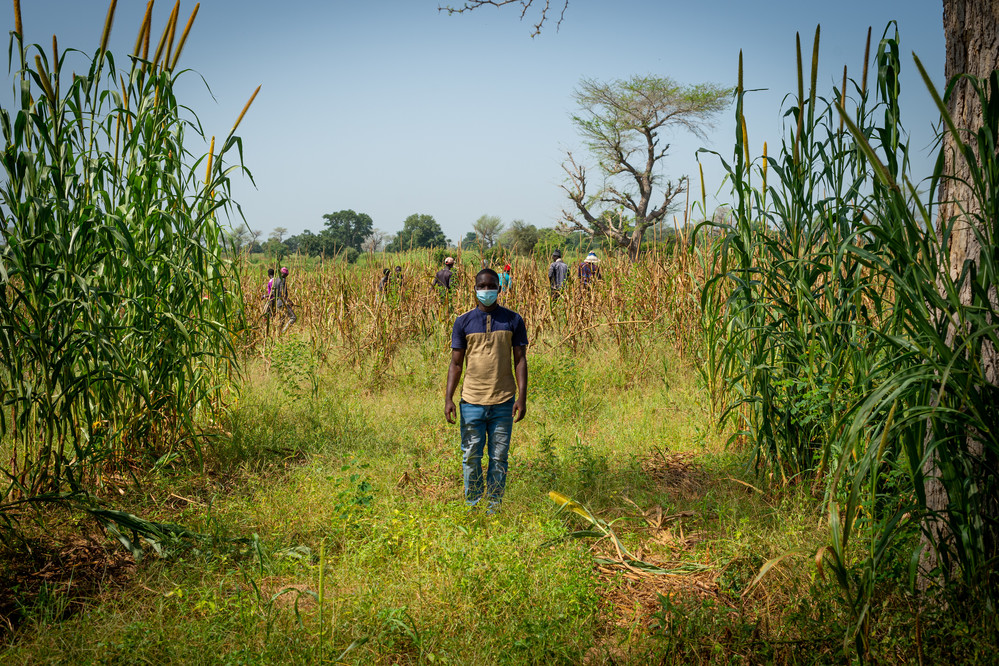
Photo: Medium
Well before the break of dawn, the women of Kaya, a northeastern city in Burkina Faso’s Centre-Nord region, prepare koura-koura (ground peanuts), which are roasted and form the base of several dishes that are a favorite among the city’s population of 170,000. Koura-koura is most often used to make peanut cakes, a staple food in the local diet. It is also a key ingredient in the city’s famous koura-koura kebab. Koura-koura is combined with spices to make a flavorful rub for the meat brochettes. Processing the koura-koura is a tradition that has been passed down for generations from mothers to daughters and provides hundreds of jobs for those in the region, including the members of the local Wend-Konta women’s association.

Photo: Medium
“Koura-koura allows us to feed our families, educate our children, and support our husbands,” says Sawadogo Haoua, president of the women’s association.
Koura-koura is a primary source of income for the families of the 13 women in the association as well for an additional 11 women who Wend-Konta pays to assist in processing the peanuts. These 11 women have been internally displaced by the insecurity in the Sahel region. Burkina Faso faces frequent attacks by violent extremist groups, who have killed thousands of people and displaced nearly two million people in the West Africa Sahel area, weakening governance and rendering swaths of territory ungovernable. This has resulted in crisis levels of food insecurity for more than 2.63 million people.
In 2021, the koura-koura processing nearly came to a halt for Wend-Konta when the women were unable to secure enough capital to purchase peanuts, the basic raw material in the production of the koura-koura. Like millions of rural women in Burkina Faso, the Wend-Konta members have limited, if any, access to adequate and timely financial services. In the rare occasions they do have access to loans, they are often able to receive only small amounts of money with high interest rates.
In late 2021, the association began working with USAID CATALYZE Sahel Finance for Resilience (F4R), which mobilizes private sector financing to address the substantial funding gap, particularly for women and youth-led enterprises in Burkina Faso. CATALYZE Sahel F4R connected Wend-Konta with the microfinance institution Baitoul Maal and helped the women apply for and negotiate a solidarity group loan on favorable terms. Solidarity lending helps decrease costs related to assessing, managing, and collecting loans for financial institutions like Baitoul Maal, and that can also help eliminate the need for collateral.
The women received the loan in about a week from Baitoul Maal, much faster than the months of paperwork it took the previous year with a different financial institution. CATALYZE Sahel F4R also helped the women to secure 25% more in financing than in 2020 and receive a lower interest rate on the new loan. Furthermore, Baitoul Maal did not require the standard 10% of the loan amount as upfront collateral. This requirement can be a financial barrier to many cash-strapped small-scale enterprises.
“We are very grateful to USAID CATALYZE for helping to ensure that we can continue our livelihood. The loan was a lifeline,” said Sawadogo.
This year, with the credit they received (approximately $8,500, nearly ten times the GDP per capita in Burkina Faso), the women bought 64 bags of peanuts and plan to buy 20 more bags in the next few weeks if the prices remain attractive. Profits are expected to increase 320% from last year. The extra income will increase the women’s economic power and improve their families’ food security. The additional income can also be used toward capital investments such as a peanut mill and larger peanut roasting machines for future processing of peanuts.
CATALYZE Sahel F4R, which began activities in August 2020, is a four-year activity, funded by USAID and implemented by Palladium under the global CATALYZE contract. CATALYZE Sahel F4R aims to mobilize $34 million in private-sector financing in both Burkina and in Niger by 2024. Launched in October 2019, CATALYZE intends to unlock $2 billion in private-sector financing for development impact over eight years, especially in underserved social sectors and frontier countries.
This article was originally published by Medium.

